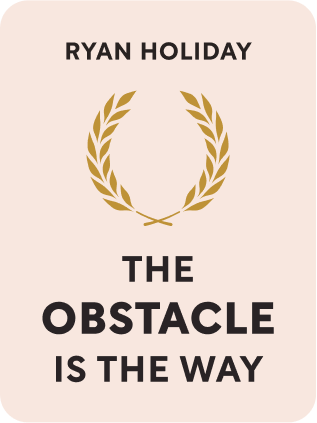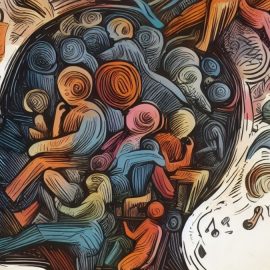

This article is an excerpt from the Shortform book guide to "The Obstacle Is The Way" by Ryan Holiday. Shortform has the world's best summaries and analyses of books you should be reading.
Like this article? Sign up for a free trial here .
How do you practice Stoic acceptance? How does cultivating total acceptance of the things that are beyond your control help you move forward in life?
Acceptance is one of the key tenets of Stoic philosophy. Once you’ve learned to face life with stoic acceptance and peacefully accept whatever is beyond your control, you can channel all your energy into achieving your goals—instead of ruminating about your powerlessness.
Keep reading to learn about the art of Stoic acceptance and how to put it into practice.
Accept Things for What They Are
Stoics divide everything in the world into two categories: what is in our control and what is outside our control. Some aspects of life are impossible to change—for instance, the actions of others, or a tragedy that has already happened. Holding an emotional grudge against a reality you can’t change will only make it more difficult to achieve your goals. Instead, peaceably accept things for what they are.
Stoic acceptance is not the same as giving up—accepting something that’s impossible to change doesn’t require losing hope. On the contrary, it’s only after accepting the constraints you’re given that you can channel your energy and attention into alternative ways to achieve your goals. There are always paths leading forward, but you won’t be able to see them if you refuse to abandon dead ends.
You don’t have to like something to accept it—just face facts. Once you do so, you’ll often be able to embrace their upsides. By accepting constraints as a fact of life, you can use them to become a better person. Once-disheartening roadblocks may push you to develop new skills or teach you valuable lessons for the future.
| Accepting Unhelpful Thoughts In The Happiness Trap, Russ Harris explains how readers can use something called “Acceptance and Commitment Therapy,” or “ACT,” to find happiness in their lives. Harris uses the same rationale as Holiday to support his advice: We should focus on what we can control and peaceably accept whatever is out of our control. Harris, however, gets more specific than Holiday, applying this logic to negative thoughts. Just as Holiday suggests you accept unpleasant constraints you can’t change and focus on paths leading forward, Harris suggests you accept thoughts that don’t serve you and focus on thoughts that do. Harris explains that by recognizing that negative thoughts are merely words and images that may or may not reflect reality, you’ll no longer see them as threats or mandates. Instead, you’ll see them as suggestions, some helpful, some unhelpful. If a negative thought pushes you toward something you can change, it’s helpful, and you should act on it. If it pushes you toward something you can’t change, you need to accept it and ignore it. Some negative thoughts are useful. For example, if you feel bad that you forgot your spouse’s birthday, this unpleasant feeling can motivate you to be more caring and attentive in the future. On the other hand, some negative thoughts are unhelpful. For example, thinking the vague statement “I’m a bad person” doesn’t direct you toward anything constructive. In this case, Harris recommends you make space for the feeling and allow it to pass. This is a perfect example of Holiday’s perspective on acceptance in action: Accepting unhelpful negative thoughts doesn’t mean giving up and remaining unhappy—on the contrary, it frees you to take advantage of the negative thoughts that can help you become a happier person. In short, accepting and ignoring the things you can’t change allows you to focus your actions where they can make a difference. |
Celebrate Everything That Happens
Once you’ve learned to peacefully accept whatever is beyond your control, Holiday argues you should take it one step further and learn to celebrate disasters. Tragic events are inevitable, but your emotional response to them is largely under your control—why not find a way for them to make you happy? Holiday is adamant that the opportunities hidden within any tragedy are more than enough to justify gratitude and celebration.
Additionally, Holiday argues that finding and embracing the good within the bad is your ultimate source of motivation. If you claim it, no obstacle can ever wear you down. Stay upbeat in all situations—act as if anything that happens is the best thing that could have happened.
| The Origin of Amor Fati: Eternal Recurrence Holiday refers to this sentiment as amor fati, a Latin phrase meaning “love of fate.” Although the ancient Stoics Epictetus and Marcus Aurelius were the first to express the idea of celebrating everything that happens, the phrase amor fati was coined by the German philosopher Friedrich Nietzsche in his book The Gay Science (1882). While Holiday frames amor fati primarily as a source of motivation to accomplish your goals, Nietzsche presents the idea as the guiding principle of a great life. He first arrives at the concept of amor fati through a thought experiment: the hypothetical situation of “eternal recurrence.” What if, after death, you had to live your life over again an infinite number of times in exactly the same way? Nietzsche concludes that the ideal thing to do in this situation would be to face life with amor fati—if your life is already predetermined, the only way you could improve your life is by choosing to celebrate tragedy, just as Holiday describes. |

———End of Preview———
Like what you just read? Read the rest of the world's best book summary and analysis of Ryan Holiday's "The Obstacle Is The Way" at Shortform .
Here's what you'll find in our full The Obstacle Is The Way summary :
- Why you should think of any obstacles as opportunities
- How Stoicism can show you the way to overcome challenges
- How Theodore Roosevelt's struggle with asthma prepared him for future struggles






